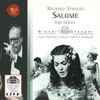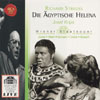R. Strauss Rosenkavalier
Showcase recordings of three Strauss operas and two dozen prima donnas from the Vienna State Opera's golden age
View record and artist detailsRecord and Artist Details
Composer or Director: Richard Strauss
Genre:
Opera
Label: Red Seal
Magazine Review Date: 3/2000
Media Format: CD or Download
Media Runtime: 138
Mastering:
ADD
Catalogue Number: 74321 69431-2

Tracks:
| Composition | Artist Credit |
|---|---|
| (Der) Rosenkavalier |
Richard Strauss, Composer
Adolf Vogel, Police Commissioner, Bass Alberta Kolm, Orphan I, Soprano Alfred Poell, Faninal, Baritone Elfriede Hochstätter, Orphan II, Mezzo soprano Erich Majkut, Animal Seller, Tenor Hans Knappertsbusch, Conductor, Bass Harald Pröglhöf, Marschallin's Major-domo, Tenor Hilde Gueden, Sophie, Soprano Hilde Rössel-Majdan, Annina, Contralto (Female alto) Judith Hellwig, Leitmetzerin, Soprano Karl Terkal, Italian Tenor, Tenor Kurt Böhme, Baron Ochs, Bass László Szemere, Valzacchi, Tenor Ljubomir Pantscheff, Notary, Bass Maria Reining, Die Feldmarschallin, Soprano Maria Trupp, Orphan III, Contralto (Female alto) Richard Strauss, Composer Sena Jurinac, Octavian, Soprano Vienna State Opera Chorus Vienna State Opera Orchestra William Wernigk, Faninal's Major-domo, Tenor |
Composer or Director: Richard Strauss
Genre:
Opera
Label: Red Seal
Magazine Review Date: 3/2000
Media Format: CD or Download
Media Runtime: 98
Mastering:
ADD
Catalogue Number: 74321 69430-2

Tracks:
| Composition | Artist Credit |
|---|---|
| Salome |
Richard Strauss, Composer
Eberhard Waechter, Jokanaan, Baritone Ewald Aichberger, Slave, Tenor Frederick Guthrie, Second Soldier, Bass Grace Hoffman, Herodias, Mezzo soprano Hans Hopf, Herod, Tenor Karl Böhm, Conductor Leonie Rysanek, Salome, Soprano Peter Wimberger, First Nazarene, Bass Reid Bunger, Cappadocian, Bass Richard Strauss, Composer Rohangiz Yachmi, Page, Mezzo soprano Siegfried Rudolf Frese, Second Nazarene, Tenor Tugomir Franc, First Soldier, Bass Vienna State Opera Orchestra Waldemar Kmentt, Narraboth, Tenor |
Composer or Director: Richard Strauss
Genre:
Opera
Label: Red Seal
Magazine Review Date: 3/2000
Media Format: CD or Download
Media Runtime: 127
Mastering:
Stereo
ADD
Catalogue Number: 74321 69429-2

Tracks:
| Composition | Artist Credit |
|---|---|
| (Die) Aegyptische Helena |
Richard Strauss, Composer
Anny Felbermayer, Third Elf, Contralto (Female alto) Dagmar Hermann, Fourth Elf, Mezzo soprano Edita Gruberová, Hermione, Soprano Gwyneth Jones, Helena, Soprano Jess Thomas, Menelaus, Tenor Josef Krips, Conductor Laurence Dutoit, Second Elf, Soprano Liselotte Maikl, First Elf, Soprano Margareta Sjöstedt, Second Servant, Mezzo soprano Mimi Coertse, Aithra, Soprano Peter Glossop, Altair, Baritone Peter Schreier, Da-ud, Tenor Richard Strauss, Composer Ruthilde Boesch, First Servant, Soprano Vienna State Opera Chorus Vienna State Opera Orchestra |
Composer or Director: Richard Strauss
Label: Red Seal
Magazine Review Date: 3/2000
Media Format: CD or Download
Media Runtime: 157
Mastering:
ADD
Catalogue Number: 74321 69427-2

Tracks:
| Composition | Artist Credit |
|---|---|
| (Der) Rosenkavalier, Movement: Da geht er hin |
Richard Strauss, Composer
Elisabeth Schumann, Soprano Lotte Lehmann, Soprano Maria Olszewska, Mezzo soprano Richard Strauss, Composer Robert Heger, Conductor Vienna Philharmonic Orchestra |
| (Der) Rosenkavalier, Movement: Mir ist die Ehre (Presentation of the Rose) |
Richard Strauss, Composer
Elisabeth Schumann, Soprano Lotte Lehmann, Soprano Maria Olszewska, Mezzo soprano Richard Strauss, Composer Robert Heger, Conductor Vienna Philharmonic Orchestra |
| Ariadne auf Naxos, Movement: Sein wir wieder gut |
Richard Strauss, Composer
Alda Noni, Soprano Erich Kunz, Baritone Irmgard Seefried, Soprano Karl Böhm, Conductor Maria Reining, Soprano Paul Schöffler, Bass-baritone Richard Strauss, Composer Vienna State Opera Orchestra |
| Ariadne auf Naxos, Movement: Wo war ich? Tot? |
Richard Strauss, Composer
Alda Noni, Soprano Erich Kunz, Baritone Irmgard Seefried, Soprano Karl Böhm, Conductor Maria Reining, Soprano Paul Schöffler, Bass-baritone Richard Strauss, Composer Vienna State Opera Orchestra |
| Ariadne auf Naxos, Movement: Grossmächtige Prinzessin |
Richard Strauss, Composer
Alda Noni, Soprano Erich Kunz, Baritone Irmgard Seefried, Soprano Karl Böhm, Conductor Maria Reining, Soprano Paul Schöffler, Bass-baritone Richard Strauss, Composer Vienna State Opera Orchestra |
| (Der) Rosenkavalier |
Richard Strauss, Composer
Richard Strauss, Composer |
| Salome |
Richard Strauss, Composer
Richard Strauss, Composer |
| (Die) Frau ohne Schatten, Movement: Was wollt ihr hier? |
Richard Strauss, Composer
Christel Goltz, Soprano Elisabeth Höngen, Contralto (Female alto) Emmy Loose, Soprano Karl Böhm, Conductor Karl Terkal, Tenor Leonie Rysanek, Soprano Ludwig Weber, Bass Richard Strauss, Composer Vienna State Opera Orchestra |
| (Die) Frau ohne Schatten, Movement: Vater, bist du's? |
Richard Strauss, Composer
Christel Goltz, Soprano Elisabeth Höngen, Contralto (Female alto) Emmy Loose, Soprano Karl Böhm, Conductor Karl Terkal, Tenor Leonie Rysanek, Soprano Ludwig Weber, Bass Richard Strauss, Composer Vienna State Opera Orchestra |
| Capriccio, Movement: ~ |
Richard Strauss, Composer
Elisabeth Schwarzkopf, Soprano Karl Böhm, Conductor Richard Strauss, Composer Vienna State Opera Orchestra |
| Arabella, Movement: ~ |
Richard Strauss, Composer
Anneliese Rothenberger, Soprano Joseph Keilberth, Conductor Lisa della Casa, Soprano Richard Strauss, Composer Vienna State Opera Orchestra |
| Daphne, Movement: ~ |
Richard Strauss, Composer
Hilde Gueden, Soprano Karl Böhm, Conductor Richard Strauss, Composer Vienna State Opera Orchestra |
| Elektra |
Richard Strauss, Composer
Richard Strauss, Composer |
| Ariadne auf Naxos, Movement: ~ |
Richard Strauss, Composer
Gundula Janowitz, Soprano Karl Böhm, Conductor Richard Strauss, Composer Vienna State Opera Orchestra |
| (Der) Rosenkavalier, Movement: Die Zeit, die ist ein sonderbar Ding |
Richard Strauss, Composer
Christa Ludwig, Mezzo soprano Josef Krips, Conductor Leonie Rysanek, Soprano Richard Strauss, Composer Vienna State Opera Orchestra |
| (Der) Rosenkavalier, Movement: Ist ein Traum (Finale). |
Richard Strauss, Composer
Christa Ludwig, Mezzo soprano Erich Kunz, Baritone Gwyneth Jones, Soprano Leonard Bernstein, Conductor Reri Grist, Soprano Richard Strauss, Composer Vienna State Opera Orchestra |
Author: Alan Blyth
The most arresting, indeed utterly thrilling set, is the 1972 Salome, lauded to the skies at the time for its musical virtues and, for the most part, for its Klimt-inspired staging. The contemporary praise for its singing and conducting is more than amply confirmed here. Rysanek, in pristine voice, sings the Salome of one's dreams. With a Wagner-sized voice but also one capable of refined pianissimos, she rises to every vocal challenge with ease, confidence and consummate intelligence. Her interpretation catches both the wilfulness and lasciviousness of the teenage princess, reaching a climax in every sense for the opera's final scene, which Rysanek sings as a sustained, rapturous love song in that intense, sensual, sensuous manner that was her trademark. At the same time she treats the text as to the manner born. Inspired by the live occasion and by her conductor (one of her greatest admirers), she gives her all in an account of the role that puts just about everyone else, Ljuba Welitsch apart, in the shade.
Bohm is the other star of the occasion. Underlining and supporting Rysanek's reading, drawing at once chamber-music refinement and ecstatic colours from the Vienna Philharmonic, he fulfils every aspect of the score, making it sound as revolutionary in style as it must have seemed at its premiere. All this is caught in an acoustic so much more natural than the larger-than-life sound on Decca's two recordings and the recent Chandos.
Waechter repeats his Jokanaan from the Decca/Solti version (3/62
Bohm's other live recording, from 1970 at Hamburg (DG, 11/71
So the ear turns with relief to the composer-librettist partnership in its prime in Der Rosenkavalier, this performance being one of the jewels of the re-opening programme in 1955. Here again one encounters a living, lived-in tradition of performing Strauss's opera that has virtually been lost. It is there in Knappertsbusch's unforced, steady yet flowing interpretation, with its wonderfully uninhibited handling of the waltz rhythms and its touches of pawky humour, to all of which the orchestra lovingly responds. It proved to be the veteran conductor's farewell to the house - and a more than worthy one.
Reining, Jurinac and Gueden repeat their association heard on the Decca recording under Erich Kleiber two years earlier (10/54
Jurinac, even more than for Kleiber, and in better voice than on the Karajan version, makes the perfect Octavian. Being a soprano as Strauss intended for the role, she soars on high without strain and is the ardent, impetuous youth to the life. Gueden is as good as for Kleiber and easier on the heights than for Karajan, and evinces the right touch of mettle for the role. Bohme made Ochs a speciality and, heard live, gives us a richly ripe portrait of the role, seldom exaggerating its humour. In support, the cast of Viennese regulars are well-versed in their roles, but Poell's Faninal sounds distinctly rusty. The mono sound is good, the stage noises seldom intrusive.
As it happens, the two-CD set of 'Strauss Prima Donnas' in Vienna begins with two extracts from the 1933 EMI highlights. Lehmann's Marschallin monologue is done as one remembered it to be. In the Rose Presentation Olszewska is a heavy, mezzo Octavian but Schumann, after 66 years, remains the sweetest and most accurate of Sophies. The Konetzni and Welitsch items - the latter's astonishing 1948 Salome - also derive from EMI's studios. The legendary 1944 Ariadne, given on Strauss's 80th birthday, has also been available before (DG, 11/94, and Preiser, 11/94). Gueden in the final scene of Daphne, ethereal, silver-voiced, is familiar from the DG issue (7/65
Everything else here is new and taken live from the State Opera. The extracts from the 1955 Frau ohne Schatten has the same cast as the Decca studio set (4/68
The final offerings, all three from Rosenkavalier, offer us three more Marschallins. Jurinac, who first broached the role at Covent Garden in 1966, and Ludwig as Octavian offer a performance to rival that of Reining and Jurinac (in her earlier role) on the complete set, though Wallberg is a dull conductor. The second extract, from a State Opera performance in Moscow, takes up, more or less, where the first ends. The Marschallin (recorded on the State Opera's visit to Moscow) is not perhaps Rysanek's best Strauss role; she is not quite precise enough of rhythm or word; and Ludwig is a somewhat blowzy Octavian (compared with Jurinac). The set ends with the final duet under Bernstein's loving care, as sweet-toothed as you might expect. Ludwig, now as the Marschallin, has only her 'Ja, ja' to commend her. Grist and Jones do not sing so well as to efface the sounds of Jurinac and Gueden on the complete set, but as a whole this collection is a marvellous souvenir of great nights at the VSO.'
Discover the world's largest classical music catalogue with Presto Music.

Gramophone Digital Club
- Digital Edition
- Digital Archive
- Reviews Database
- Full website access
From £8.75 / month
Subscribe
Gramophone Full Club
- Print Edition
- Digital Edition
- Digital Archive
- Reviews Database
- Full website access
From £11.00 / month
Subscribe
If you are a library, university or other organisation that would be interested in an institutional subscription to Gramophone please click here for further information.





